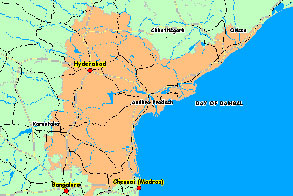New Indian state sparks protest
NEW DELHI: Protesters took to the streets Friday, setting public buses on fire and clashing with police, in anger over India's decision to carve a new state out of the southern region of Andhra Pradesh.
The conflict highlighted the tensions that underlie the vast array of ethnic and linguistic groups bound together in the massive Indian nation.
The country has allayed some of that friction by giving substantial power to its 28 states and creating new states to empower still more ethnic minorities.
In a surprise move, the federal government agreed Wednesday to give in to a high-profile hunger strike and create the new state of Telangana out of the vast state of Andhra Pradesh. Telangana supporters have complained that their area in the north of the state was underdeveloped and ignored by powerful politicians from southern Andhra Pradesh.
A mob rampaged through the streets of Hyderabad, the capital of Andhra Pradesh, Friday in anger over the government's decision. Under the proposal, Hyderabad would be located deep inside Telangana, though it was not clear whether it would be part of the new state, the old state, or serve as a joint capital.
The crowd lit a bus ablaze and threw rocks at vehicles, while police tried to disperse them with batons.
The decision also stirred anger within the ruling Congress Party, with more than 130 Andhra Pradesh legislators resigning from the party to oppose the division of one of India's largest states.
Already, the government appeared to be backtracking. Andhra Pradesh chief minister K. Rosaiah said the government would move ahead with the decision only if a broad consensus was evident among the people of the state.
The government's initial decision has given hope to ethnic minority groups across India who have been pushing for states of their own for decades, including in the remote northeast, where long simmering separatist demands often boil over into violence.
"If Andhra Pradesh can be divided to create a new state, why not Assam? Our demand for a separate Bodoland state for the Bodo ethnic group is more than two decades old," Hagrama Mohilary, chief of the autonomous Bodoland Territorial Council, said Friday.
Meanwhile, critics said the government did not properly study the ramifications before announcing its decision on Telangana.
"The decision was taken in immense haste. It wasn't thought through. The party's own legislators are rebelling against this," said Pratap Bhanu Mehta, political analyst and head of the Center for Policy Research in New Delhi.
He said activists' demands that large states be divided along ethnic lines to empower the minority groups has merit.
"India has four times the population of the United States, but far fewer states. A demand for smaller more representative states is justified, but this needs to be done within a constitutional framework and not by giving in to political agitations of this kind," Mehta said.
There are also movements calling for the break up of at least six other states besides Andhra Pradesh.
On Friday, leaders of the Gorkhas _ a group of ethnic Nepalis living in West Bengal _ called for an indefinite strike to push their decades-old demand for the creation of Gorkhaland.






